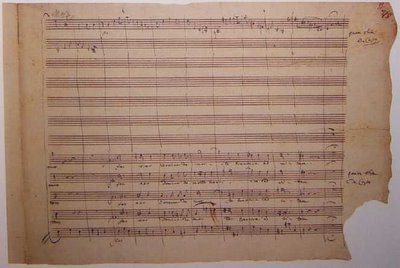Mozart's Requiem
I bought a CD of Mozart's Requiem, a few days back. The Requiem is considered to be one of the masterpieces of Mozart and is also shrouded in mystery. Although I have not listened to it fully and have not been able to appreciate the composition and its beauty, it had a different feel from the few Western Classical Music compositions that I have heard so far.

See above the image of Mozart's original handwritten score of Requiem.
Wolfgang Amadeus Mozart known as one of the first Master Composers along with the likes of Bach and Beethoven, is said to have composed the Requiem for his "own funeral". It is said that he had received a commission from an unknown intermediary of Count Franz von Walsegg-Stuppach for writing a Requiem(a song or hymn of mourning composed or performed as a memorial to a dead person)Score to be performed on the anniversary of his Wife's death. At his death on 5 December 1791 Mozart had only been able to complete the first movement of the Requiem's score—the Introit: Requiem—and to write part scores of nine of the following 13 sections.
Read about Mozart's Requiem here:
http://www.everything2.com/index.pl?node=Mozart%20Requiem
A few more points of interest:
- It is said that Mozart burst into tears and could go no further when it came to the Lacrimosa, of which he only had written the first eight bars.
- Mozart passed away five minutes to one on the morning of December 5th, to be buried a day or so later in an unmarked grave.
- After her husband's death, Constanze Mozart claimed that he had a premonition that the Requiem was an omen of his own coming death.
- Though it was expected that Constanze would entrust the completion of the work to Mozart's pupil and constant companion Franz Xavier Süssmayer, instead she asked Josef Eybler. He later gave up the task and the unfinished score fell to Süssmayer in the end anyway.

See above the image of Mozart's original handwritten score of Requiem.
Wolfgang Amadeus Mozart known as one of the first Master Composers along with the likes of Bach and Beethoven, is said to have composed the Requiem for his "own funeral". It is said that he had received a commission from an unknown intermediary of Count Franz von Walsegg-Stuppach for writing a Requiem(a song or hymn of mourning composed or performed as a memorial to a dead person)Score to be performed on the anniversary of his Wife's death. At his death on 5 December 1791 Mozart had only been able to complete the first movement of the Requiem's score—the Introit: Requiem—and to write part scores of nine of the following 13 sections.
Read about Mozart's Requiem here:
http://www.everything2.com/index.pl?node=Mozart%20Requiem
A few more points of interest:
- It is said that Mozart burst into tears and could go no further when it came to the Lacrimosa, of which he only had written the first eight bars.
- Mozart passed away five minutes to one on the morning of December 5th, to be buried a day or so later in an unmarked grave.
- After her husband's death, Constanze Mozart claimed that he had a premonition that the Requiem was an omen of his own coming death.
- Though it was expected that Constanze would entrust the completion of the work to Mozart's pupil and constant companion Franz Xavier Süssmayer, instead she asked Josef Eybler. He later gave up the task and the unfinished score fell to Süssmayer in the end anyway.


0 Comments:
Post a Comment
<< Home